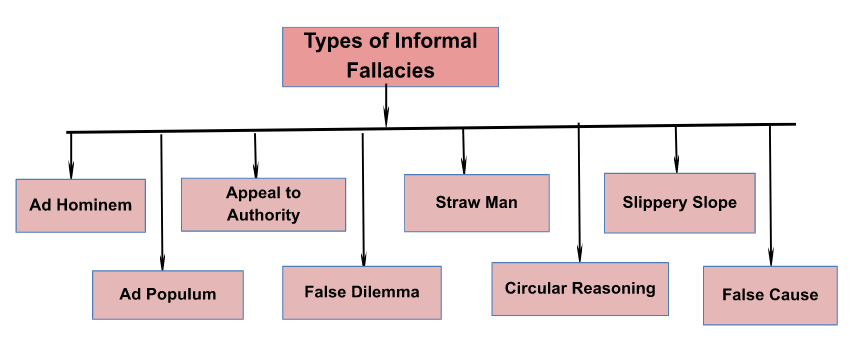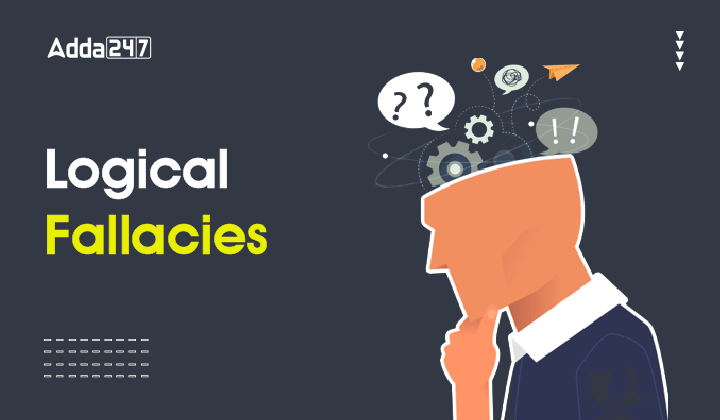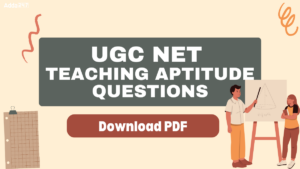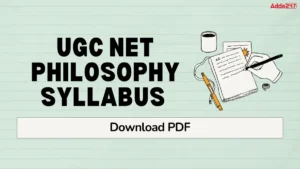Table of Contents
Logical fallacies are errors in reasoning or argumentation that can lead to faulty or deceptive conclusions. They are common in discussions and debates and can undermine the validity and soundness of an argument.
In the pursuit of sound reasoning and critical thinking, it is vital to identify and understand the presence of fallacies. Fallacies are deceptive and faulty patterns of reasoning that can lead us astray from logical and rational discourse. They often appear persuasive at first glance but upon closer inspection, reveal flaws and inconsistencies.
UGC NET Study Notes for Paper 1
Logical Fallacies Types
- Formal fallacies
- Informal fallacies
Formal fallacies
These are characterized by arguments that possess an invalid structure or form. The prominent types of formal fallacies are as follows:

Assiddha or Sadhyasama fallacy
- It occurs when someone assumes that because the conclusion has not been proven false, it must be true.
- Example: There’s no evidence that ghosts don’t exist, so they must be real.
Savyabhicara fallacy
- It is also known as an irrelevant conclusion, which occurs when an argument presents evidence or reasoning that is unrelated or irrelevant to the original point being discussed.
- Example: “Talking about renewable energy in the discussion topic of climate change.”
Satpratipakṣa Fallacy
- It means ‘inferentially contradicted middle by another middle’.
- Example: Sound is eternal because it is audible and sound is non-eternal because it is produced like a pot.
Viruddha fallacy
- The Viruddha fallacy occurs when contradictory or inconsistent statements are made within an argument, leading to logical inconsistency.
- Example: “All cats are mammals, but some cats are not mammals.”
Badhita
- It is non-inferentially contradicted middle
- Example: Water is cold because it is a substance
Informal fallacies
These are marked by arguments that contain incorrect or irrelevant premises. The several types of informal fallacies are as follows:

Ad Hominem Fallacy
- This fallacy occurs when an argument attacks the person making the argument rather than addressing the argument itself.
- Instead of addressing the claim or argument, the focus shifts to personal characteristics, flaws, or irrelevant aspects of the person.
- Example: You can’t trust their argument because they are known to be dishonest.
Ad Populum Fallacy
- The ad populum fallacy occurs when someone argues that a claim must be true or false because it is popular or widely believed, without considering other evidence or logical reasoning.
- Example: Everyone knows that astrology is real. Millions of people believe in it, so it must be true.
Appeal to Authority Fallacy
- This fallacy involves accepting a claim as true simply because someone in a position of authority or expertise says it is true.
- Example: Dr. Smith said it, so it must be true.
False Dilemma Fallacy
- This fallacy, known as the black-or-white fallacy, limits options to two extremes, ignoring other available choices.
- It oversimplifies complex issues by framing them as binary choices, ignoring the nuances or alternatives that may exist.
- Example: Either you’re with us or you’re against us.
Straw Man Fallacy
- The straw man fallacy involves misrepresenting or exaggerating an opponent’s argument in order to make it easier to attack.
- Instead of addressing the argument directly, a distorted version is presented to make it easier to refute.
- Example: They claim we want to ban all cars, but in reality, we’re advocating for better public transportation.
Circular Reasoning Fallacy
- Circular reasoning, also known as begging the question, occurs when the conclusion of an argument is used as one of the premises.
- This type of fallacy creates an illusion of logical validity but fails to provide meaningful evidence or reasoning.
- Example: The Bible is true because it is the word of God, and we know it’s the word of God because the Bible says so.
Slippery Slope Fallacy
- The slippery slope fallacy assumes negative outcomes from a small initial step without sufficient evidence, overgeneralizing and exaggerating potential consequences despite legitimate concerns.
- Example: Allowing smartphones in class leads to using them during exams, causing the education system to collapse.
False Cause Fallacy
- The false cause fallacy assumes causation based solely on temporal sequence, lacking proper evidence or reasoning.
- This fallacy can lead to erroneous conclusions and misunderstandings of cause-and-effect relationships.
- Example: Every time I wear my lucky socks, my team wins, so my socks must be the reason for our success.
In Conclusion, Fallacies hinder logical thinking and effective communication. Recognizing and understanding them is crucial for robust arguments and meaningful discourse, fostering critical thinking, respecting diverse perspectives, and pursuing truth.
Logical Fallacies, Download UGC NET Reasoning Study Notes PDF
| UGC NET Important Links | |
| UGC NET 2023 Notification | UGC NET New Syllabus |
| UGC NET Previous Year Papers | UGC NET Teacher Salary |




 UGC NET Teaching Aptitude Questions Answ...
UGC NET Teaching Aptitude Questions Answ...
 What is Soil Pollution - Causes, Effects...
What is Soil Pollution - Causes, Effects...
 UGC NET Philosophy Syllabus 2025 PDF Dow...
UGC NET Philosophy Syllabus 2025 PDF Dow...













